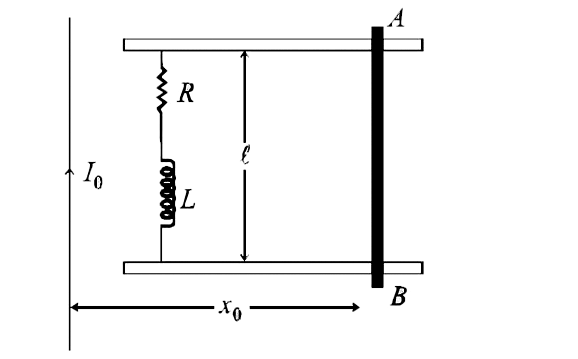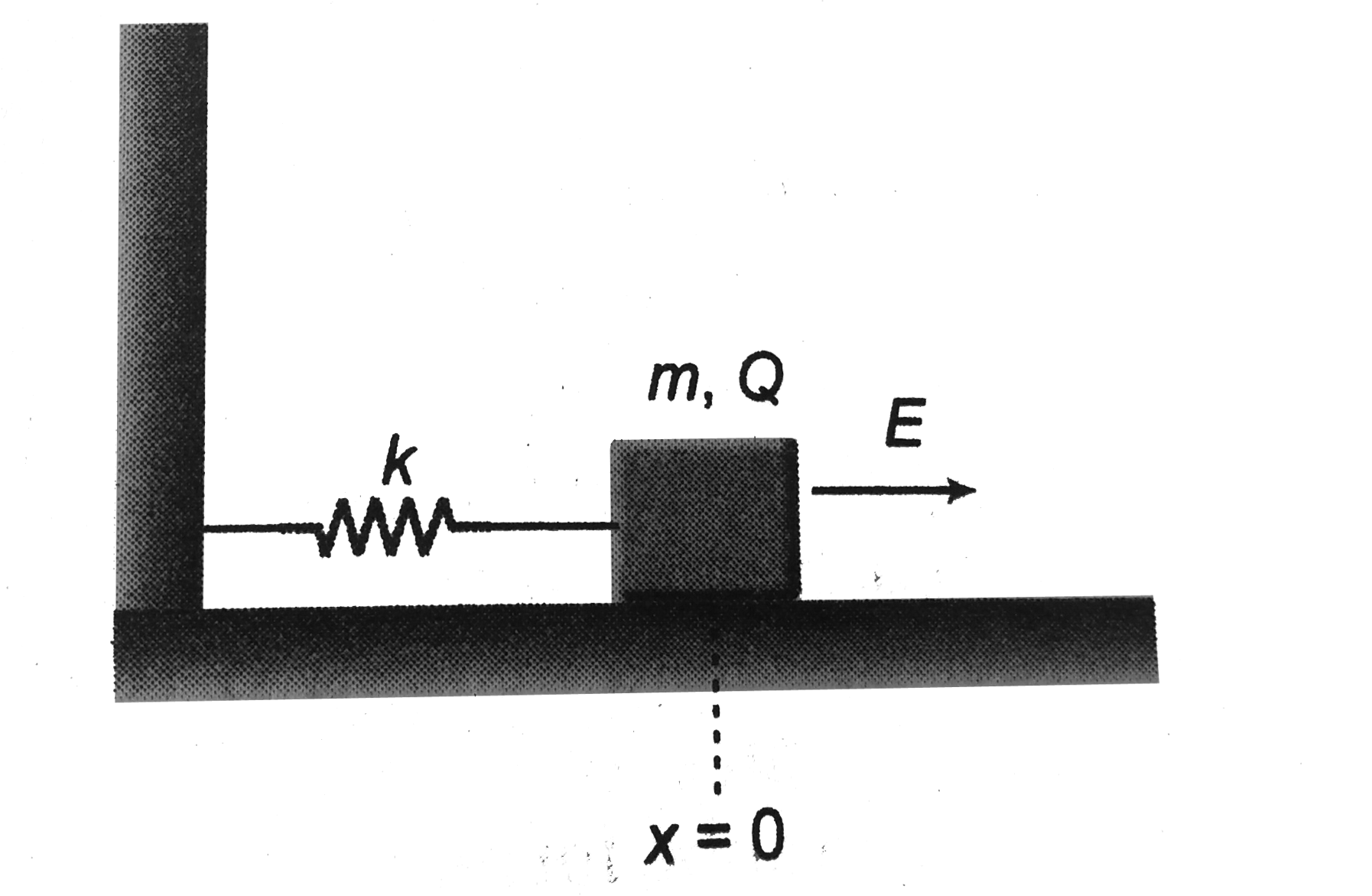While studying the decompoistion of gaseous , it is observed that a plot of logarithm of its partial pressure versus time is linear. What kinetic parameters can be obtained form this observation?
The correct Answer is:First order reaction
To solve the question regarding the decomposition of gaseous N2O5 and the implications of a linear plot of the logarithm of its partial pressure versus time, we can follow these steps:
Step 1: Understand the relationship between logarithm of partial pressure and time
The problem states that a plot of the logarithm of the partial pressure of N2O5 versus time is linear. This suggests that the reaction follows first-order kinetics.
Step 2: Recall the first-order reaction equation
For a first-order reaction, the relationship between the concentration (or partial pressure) of the reactant and time can be expressed as:
log(PP0)=−k2.303t+constant
where:
- P is the partial pressure at time t
- P0 is the initial partial pressure
- k is the rate constant
- t is time
Step 3: Identify the kinetic parameters
From the linear plot of log(PP0) versus time, we can identify two key kinetic parameters:
1. Order of the Reaction: Since the plot is linear, it confirms that the decomposition of N2O5 is a first-order reaction.
2. Rate Constant (k): The slope of the line obtained from the plot is equal to −k2.303. Therefore, we can calculate the rate constant k from the slope of the line.
Step 4: Conclusion
Thus, from the observation that the plot of the logarithm of the partial pressure versus time is linear, we can conclude that:
- The reaction follows first-order kinetics.
- The rate constant k can be determined from the slope of the plot.
The problem states that a plot of the logarithm of the partial pressure of N2O5 versus time is linear. This suggests that the reaction follows first-order kinetics.
For a first-order reaction, the relationship between the concentration (or partial pressure) of the reactant and time can be expressed as:
log(PP0)=−k2.303t+constant
where:
- P is the partial pressure at time t
- P0 is the initial partial pressure
- k is the rate constant
- t is time
From the linear plot of log(PP0) versus time, we can identify two key kinetic parameters:
1. Order of the Reaction: Since the plot is linear, it confirms that the decomposition of N2O5 is a first-order reaction.
2. Rate Constant (k): The slope of the line obtained from the plot is equal to −k2.303. Therefore, we can calculate the rate constant k from the slope of the line.
Thus, from the observation that the plot of the logarithm of the partial pressure versus time is linear, we can conclude that:
- The reaction follows first-order kinetics.
- The rate constant k can be determined from the slope of the plot.
Topper's Solved these Questions
- CHEMICAL KINETICSBOOK - CENGAGE CHEMISTRY ENGLISHCHAPTER - CHEMICAL KINETICSEXERCISE - Archives True/False
1 Videos
- CARBOXYLIC ACIDS AND THEIR DERIVATIVESBOOK - CENGAGE CHEMISTRY ENGLISHCHAPTER - CARBOXYLIC ACIDS AND THEIR DERIVATIVESEXERCISE - Exercises Archives (Analytical And Descriptive)
34 Videos
- COORDINATION COMPOUNDSBOOK - CENGAGE CHEMISTRY ENGLISHCHAPTER - COORDINATION COMPOUNDSEXERCISE - Archives Subjective
18 Videos
Similar Questions
A : The decomposition of gaseous N2O5 follows first order kinetics.
R : The plot of log of its partial pressure versus time is linear with slope , −k2.303 and having intercept equal to log P.
View SolutionThe decompoistion of N2O5 in CCI4 solution at 318K has been studied by monitoring the concentration of N2O5 in the solution. Initially, the concentration of N2O5 is 2.33M and after 184min, it is reduced to 2.08M. The reaction takes place according to the equation:
2N2O5→4NO2+O2
Calculate the average rate of this reaction in terms of hours, minutes, and seconds. What is the rate of Production of NO2 during this period?
View SolutionThe decompoistion of N2O5 in CCI4 solution at 318K has been studied by monitoring the concentration of N2O5 in the solution. Initially, the concentration of N2O is 2.33M and after 184min, it is reduced to 2.08M. The reaction takes place according to the equation:
2N2O5→4NO2+O2
Calculate the average rate of this reaction in terms of hours, minutes, and seconds. What is the rate of Production of NO2 during this period?
View SolutionFor his 18th birthday in February Peter plants to turn a hut in the garden of his parents into a swimming pool with an artifical beach. In order to estimate the consts for heating the water and the house , peter obtains the data for the natural gas combustion and its price.
What is the total energy (in MJ) needed for Peter's "winter swimming pool" calculated in 1.3 and 1.4? How much natural gas will he need, if the gas heater has an efficiency of 90.0% ?
What are the different costs for the use of either natural gas or electricity ? Use the values given by PUC for your calculations and assume 100% efficiency for the electric heater.
Table 1: Composition of natural gas
Chemical substancemol fraction xD1H∘(KJmol−1)−1S∘(Jmol−1K−1)−1C∘p(Jmol−1K−1)−1CO2(g)0.0024−393.5213.637.1N2(g)0.01340.0191.629.1CH2(g)0.9732−74.6186.335.7C2H3(g)0.0110−84.0229.252.2H2Og−−285.870.075.3H2Og−−241.8188.833.6H2Og−0.0205.229.4
Equation
J=E(A.Δt)−1=!!λwall.ΔT.d−1, where
J= energy flow E along a temperature gradient (wall direction Z) par area A and time Δt, d-wall thickness , λwall -heat conductivity , ΔT - difference in temperature between the inside and the outside of the house.
View SolutionAt sea level, the composition of dry air is approximately N2=75.5%, O2=23.2%, and Ar=1.3% by mass. If the total pressure at sea level is 1bar, what is the partial pressure of each component?
View SolutionA metal bar AB can slide on two parallel thick metallic rails separated by a distance l. A resistance R and an inductance L are connected to the rails as shown in the figure. A long straight wire carrying a constant current I0 is placed in the plane of the rails and perpendicular to them as shown. The bar AB is held at rest at a distance x0 from the long wire. At t=0, it is made to slide on the rails away from wire. Answer the following questions.
(a) Find a relation among i,didtanddϕdt, where i is the current in the circuit and ϕ is the flux of the megnetic field due to the long wire through the circuit.
(b) It is observed that at time t=T, the metal bar AB si at a distance of 2x0 from the long wire and the resistance R carries a current (i1). Obtain an expression for the net charge that has flown through riesistance R form t=0 to t=T.
(c) THe bar is suddenly stopped at time T. THe current through resistance R is found to be i14 at time 2T. Find the value of LR in terms of hte other given quantities.

View SolutionA gaseous mixture containing 8g of O2 and 227 mL of N2 at STPis enclosed in flask of 5 L capacity at 0∘C. Find the partial pressure of each gas and calculate the total pressure in the vessel.
View SolutionThe following reaction descomposes N2O5→2NO2+12O2. At a 25 degree centigrade the rate constant of the reaction is 5×10−3sec−1. The intial pressure of N2O5 is 0.2 atm. If total pressure of gaseous mixture becomes 0.35 atm, then calculate the time of decomposition of N2O5.
View SolutionDinitrogen pentoxide decomposes to NO2 and O2 following first order kinetics N2O5(g)→2NO2+O2(g)
0.2 mole of N2O5 was taken in 2L vessel and heated at 200K. The concentrated of N2O5 is measured at different intervals . Following graphs A and B were obtained from the data.

Slope of straight line in graph 'A' is −1.2×102sec−1 . What is half life of the reaction ?
View SolutionA 4.00kg block carrying a charge Q=50.0μC is connected to a spring for which k = 100 N/ m. The block lies on a frictionless horizontal track, and the system is immersed in a uniform electric field of magnitude E=5.00×105Vm, directed as shown in figure. If the block is released from rest when the spring is unstretched (at x = 0).

(a) By what maximum amount does the spring expand?
(b) What is the equilibrium position of the block?
(c) Show that the block's motion is simple harmonic and determine its period.
(d) Repeat part (a) if the coefficient of kinetic friction between block and surface is 0.2.
View Solution
